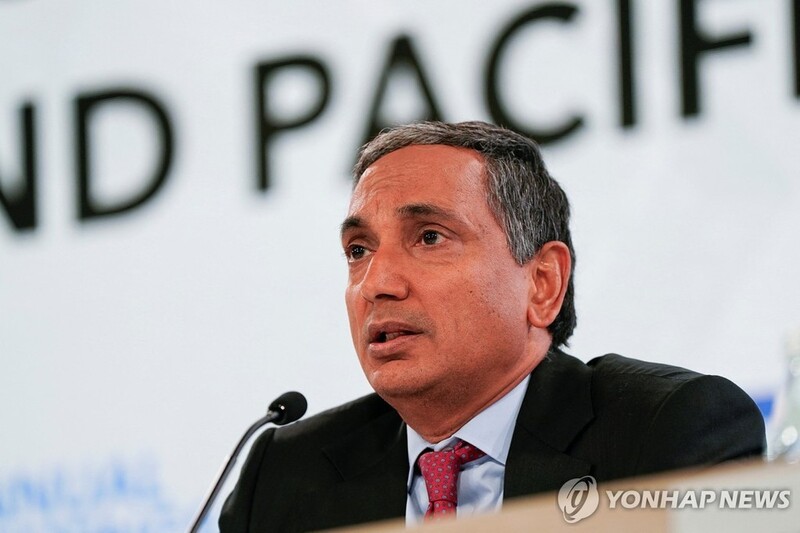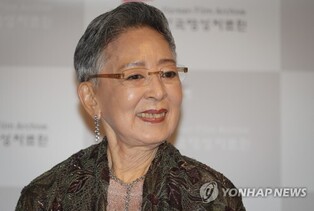 |
| ▲ International Monetary Fund Deputy Director of the Asia and Pacific Department Thomas Helbling attends a press briefing at the IMF/World Bank 2025 Annual Meetings in Washington on Oct. 16, 2025, in this photo released by Reuters. (Yonhap) |
 |
| ▲ International Monetary Fund (IMF) Director of the Asia and Pacific Department Krishna Srinivasan attends a press briefing at the IMF/World Bank 2025 Annual Meetings in Washington on Oct. 16, 2025, in this photo released by Reuters. (Yonhap) |
IMF official-Korea
IMF expects pickup in Korea's near-term economic growth, but warns of tariff impact: official
By Song Sang-ho
WASHINGTON, Oct. 16 (Yonhap) -- The International Monetary Fund (IMF) sees a pickup in the South Korean economy's near-term growth due to the country's lower political uncertainty and policy support, but anticipates that U.S. tariff effects will start to build, weighing on its potential growth, an IMF official said Thursday.
Thomas Helbling, deputy director of the Asia-Pacific department, made the remarks during a press conference, after the IMF published its World Economic outlook on Tuesday, slightly raising its growth projection for South Korea to 0.9 percent for this year and maintaining its 2026 outlook for Korea at 1.8 percent.
"In the near term, we see a pickup in growth (for the Korean economy) for two reasons. One -- lower domestic political uncertainty, which will help consumption," the official said.
"Plus, more macroeconomic policy support. The (Korean) government adopted two supplementary budgets that with a fiscal impulse in the order of just below 1 percent of gross domestic product ... will help to boost growth in the second part of the year and then into the next year," he added.
Pointing to the 2026 growth outlook for Korea at 1.8 percent as "close to" potential growth, he said that the IMF would not expect Korea to return to a potential growth rate of 2 percent to 2.1 percent now, citing the looming impact of tariffs on Asia's fourth-largest economy.
"The tariff effects will start building, front-loading, and special factors have partly sort of mitigated the impact of tariffs so far, but they will be building to some extent," he said.
A material increase in the Korean economy's potential growth is possible with structural reforms, the official pointed out.
"So macro policies cannot help. Fiscal policy can play a supplementary role in the sense that you can redirect expenditure. You can support reforms to raise productivity ... labor market reforms and so on," he said.
He stressed that fiscal stimulus is not the instrument to raise potential growth.
"It requires structural reforms. The government's new economic growth strategy has recognized this and will support productivity, and it will also support human capital, education and diversification of the economy," he said. "All factors that should help raise potential in the future."
Asked about Korea's national debt-to-gross domestic product (GDP) ratio currently at around 50 percent, Helbling described the level of Korea's debt as a relatively low one, which allows its government to have "fiscal space in the near term."
But in the short term, Korea should use its fiscal space "prudently," he said, while noting the need to connect short-term and long-term policy efforts.
"The key point for Korea, though, is to connect the short-term to the longer-term. In the longer-term, Korea will face fiscal pressures from the demographics -- the rapidly aging population. So it's important to prepare for rising pension and health costs," he said.
Commenting on renewed trade tensions between the U.S. and China, Krishna Srinivasan, director of the Asia-Pacific department, said that Asia will be affected by the trade spat more than other regions.
"I showed that this is a region which is highly integrated in global supply chains. This is a region which is highly dependent on external trade," he said. "So anytime there are shocks to global trade, it's going to affect Asia that much more."
But he noted that there is a "silver lining" for Asia, as he underscored Asia's opportunity to pivot more towards domestic demand-led growth and tap into the potential for benefits from regional integration.
(END)
(C) Yonhap News Agency. All Rights Reserved













![[가요소식] 10대 싱어송라이터 민서, 데뷔 싱글 '미로'](https://korean-vibe.com/news/data/20251211/yna1065624915952705_742.jpg)









